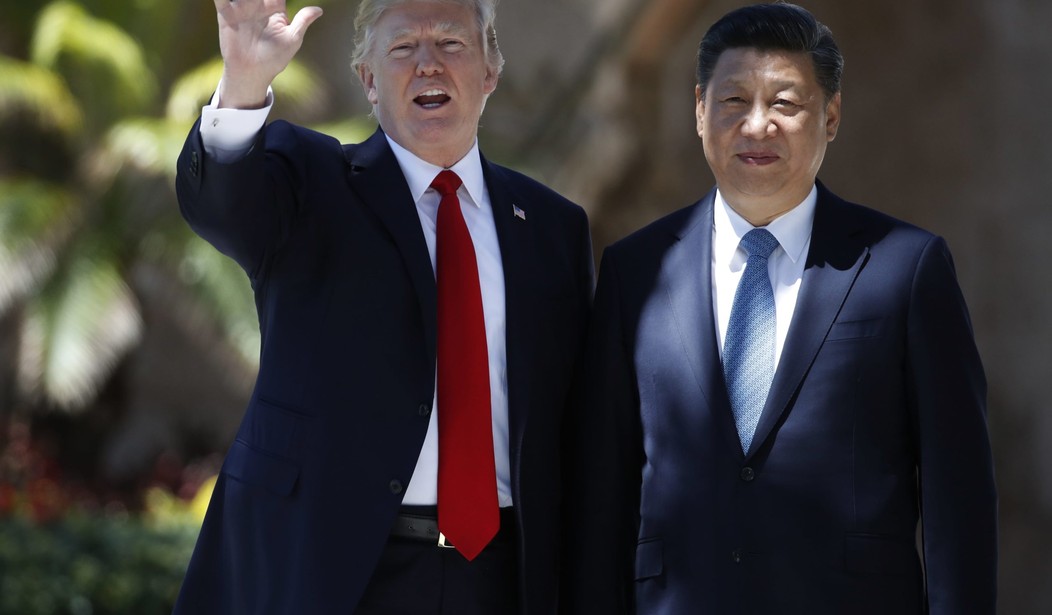The rivalry between the U.S. and China in the Pacific, while still cold, is increasing in intensity and marked by sudden shifts of balance.
Only days after Trump reached out to Thailand and the Philippines, Ankit Panda of the The Diplomat notes yet another swerve. He tweets:
[I]ncreasingly hard to avoid [the] conclusion that Trump is appeasing China in #SouthChinaSea for cooperation on #NorthKorea.
He quotes a New York Times article, which reports Trump has gone on the defensive in the South China Sea in order to push north against Pyongyang:
More than 100 days into the Trump presidency, no American Navy ship has gone within 12 miles of any of the disputed islands in the South China Sea, Defense Department officials said.
The decision not to challenge China’s territorial claims represents a remarkable deference toward Beijing from an administration that is increasingly turning toward President Xi Jinping for help amid the escalating crisis in the Korean Peninsula. …
The simmering crisis in North Korea seems to have changed the Trump administration’s earlier assumptions on how to handle China. Mr. Trump campaigned on being tough on Beijing, promising that he would label China a currency manipulator and would go after Beijing on trade.
But with North Korea escalating its provocative behavior the past three months, attempting nine missile launches on six occasions since Mr. Trump came to power, his administration has adopted a more conciliatory air with Beijing as the president seeks help to rein in Pyongyang.
The rhetoric of conflict was amped up by reports Beijing warned its citizens to leave North Korea “over fears that tensions between Pyongyang and Washington DC could escalate”:
The Korea Times reports that the Chinese embassy in North Korea began advising Korean-Chinese residents to return to China last month, over fears the country’s military provocations could lead to retaliation from the US.
According to Radio Free Asia, a US-based radio station that broadcasts to Asian countries, the embassy began sending the message to citizens ahead of the 85th anniversary of the Korean People’s Army last month.
How much of this represents Chinese political pressure on Kim is hard to say, but a recent AFP article quoted a Shanghai academic who openly questioned the relevance of Beijing’s military pacts with North Korea. The attempt to bring Kim to the bargaining table appears to be shifting to high gear, with at least a little help from China.
In seeming response to Trump’s démarche, Reuters reports that Pyongyang is turning to Russia for support:
Some academics who study North Korea argue Kim could be looking for Russia to ease any pain if China, which accounts for about 90 percent of North Korea’s trade, steps up sanctions against the isolated country as part of moves to deter its nuclear and missile programs.
It’s a game of deception and possible double-cross moving at a tempo almost faster than the news cycle. The New York Times suggests that Trump has outsourced the management of the crisis to the inner cabinet. Reporting on the denial of FONOPS in the South China Sea, the Times wrote:
… it remained unclear on Tuesday whether it was Defense Secretary Jim Mattis; Gen. Joseph F. Dunford Jr., the chairman of the Joint Chiefs of Staff; or one of their deputies who turned down the three requests. Defense officials said the White House was not involved. (Italics mine).
That may account for the rapidity of events. Perhaps part of Trump’s strategic ambiguity includes creating uncertainty in foreign leaders about who’s running the show, and how fast Washington can react to the countermoves of Moscow, Pyongyang and Beijing.
Whoever is leading the campaign in Washington seems to think speed equals success. Will it be more successful than the predictable Obama years?
Featured book: The Mattis Way of War
Follow Wretchard on Twitter
For a list of books most frequently purchased by readers, visit my homepage.
Support the Belmont Club by purchasing from Amazon through the links below.
Books:
The Revenge of Geography: What the Map Tells Us About Coming Conflicts and the Battle Against Fate, Author Robert D. Kaplan builds on the insights, discoveries, and theories of great geographers and geopolitical thinkers to look back at critical pivots in history and then to look forward at the evolving global scene. The result is an interpretation of the next cycle of conflict throughout Eurasia and a future that can be understood in the context of temperature, land allotment, and other physical certainties. To those who suggest that globalism will trump geography, this book shows how timeless truths and natural facts can help prevent this century’s looming cataclysms.
The Worst Hard Time: The Untold Story of Those Who Survived the Great American Dust Bowl, by Timothy Egan. The book tells the story of the dust storms that terrorized America’s High Plains in the darkest years of the Great Depression and the people that held on: their desperate attempts to carry on through blinding black blizzards, crop failure, and the deaths of loved ones.
The No-Fuss Bread Machine Cookbook: Hands-Off Recipes for Perfect Homemade Bread, by Michelle Anderson. Finally, a bread machine cookbook that shows you how to use your bread machine for its intended purpose ― convenience! This is the first and only collection of truly easy, hassle-free recipes that give you delicious homemade loaves of bread every time, with more than 150 recipes using easy-to-find ingredients and minimal work.
Modern Prometheus: Editing the Human Genome with Crispr-Cas9, by Jim Kozubek. Would you change your genes if you could? As we confront the ‘industrial revolution of the genome’, the recent discoveries of Crispr-Cas9 technologies are offering, for the first time, cheap and effective methods for editing the human genome. Tracing events across a fifty-year period, from the first gene splicing techniques to the present day, Kozubek weaves together the fascinating stories of many of the scientists involved in the development of gene editing technology, demystifies how the technology really works and provides thought-provoking reflections on the ‘commodification’ of life.
For a list of books most frequently purchased by readers, visit my homepage.
Did you know that you can purchase some of these books and pamphlets by Richard Fernandez and share them with your friends? They will receive a link in their email and it will automatically give them access to a Kindle reader on their smartphone, computer or even as a web-readable document.
The War of the Words, Understanding the crisis of the early 21st century in terms of information corruption in the financial, security and political spheres
Rebranding Christianity, or why the truth shall make you free
The Three Conjectures, reflections on terrorism and the nuclear age
Storming the Castle, why government should get small
No Way In at Amazon Kindle. Fiction. A flight into peril, flashbacks to underground action.
Storm Over the South China Sea, how China is restarting history in the Pacific
Tip Jar or Subscribe or Unsubscribe to the Belmont Club










Join the conversation as a VIP Member